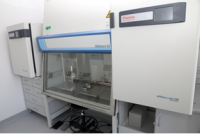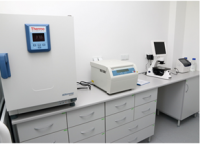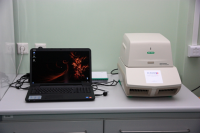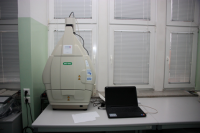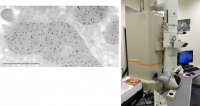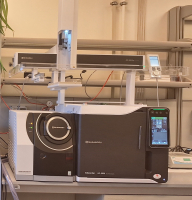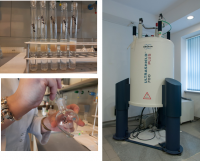Department of Pharmaceutical Biochemistry
Faculty of Pharmacy
LABORATORY OF METABOLIC DISORDERS
LABORATORY OF METABOLIC DISORDERS
Department of Pharmaceutical Biochemistry, MUG
Faculty of Pharmacy
CORE FACILITY ACTIVITIES
The main goal of the Laboratory for the Study of Metabolic Disorders (LSMD) is to perform tests with the use of molecular biology techniques and advanced analytical techniques in clinical material. LSMD was founded on the basis of many years of experience of the employees of the Department of Pharmaceutical Biochemistry of the MUG, a unit of the Faculty of Pharmacy, in research conducted in cooperation with many clinics of the University Clinical Center, as well as other national and foreign clinical units. We also cooperate closely with the Department of Biochemistry of the Medical Faculty of the MUG and the Department of Environmental Analysis of the University of Gdańsk, where there is an analytical laboratory in which research in clinical material is carried out. Thanks to the use of advanced analytical techniques, such as mass spectrometry or nuclear magnetic resonance spectroscopy, our research allows us to identify advanced metabolic disorders. On the other hand, research using molecular biology techniques allows us to understand the molecular mechanisms of these disorders and identify new, potential therapeutic or diagnostic strategies. The combination of these research methods allows for a better understanding of the underlying causes of diseases and their more effective treatment. LSMD primarily focuses on the study of lipid disorders, such as disturbances in the profile of fatty acids in various diseases, such as pathological obesity, neoplastic diseases and kidney diseases. The universality of our research workshop has resulted in cooperation with many research teams operating within the Priority Research Areas of IDUB. Thanks to the experience of the employed specialists, our laboratory strengthens the interdisciplinary nature of research work carried out at the MUG and enables cooperation with external units in the country and abroad.
Research methods used
Studies in in vitro models
We conduct research on numerous primary and secondary cell lines. We have 2 independent incubators, one of which has the ability to regulate the oxygen level and achieve hypoxic conditions.
Research using molecular biology techniques
Study of gene expression on the mRNA level
Tests are performed using the Real-time RT-PCR technique. RNA is isolated from tissues or in vitro cultured cells. Then, especially in the case of clinical material, the quality of the isolated RNA is verified by capillary electrophoresis (Experion – BioRad).
Study of gene expression at the protein level
The tests are performed using the Western Blotting method with the use of the Chemi-Doc chemoluminescence detection system (BioRad).
It is also possible to perform proteomic tests in cooperation with the Department of Cytology and Plant Embryology, Faculty of Biology, University of Gdańsk, using immunohistochemical methods that allow to visualize changes in the distribution of the studied proteins in tissues, as well as the ImmunoGold method using electron microscopy, which allows for the precise location of the studied proteins .
Research using advanced analytical techniques
Gas chromatography coupled to mass spectrometry (GC-MS)
GC-MS is an excellent technique for the determination of low molecular weight compounds, such as fatty acids, which are the basic structural element of every living cell. Thanks to this technique, we determine the profile of over 70 fatty acids in matrices such as cells, biofluids, animal and human tissues.
Recently, thanks to funding from IDUB, a new gas chroatograph coupled with a mass spectrometer was purchased, allowing for even more accurate analyses.
Nuclear magnetic resonance spectroscopy (NMR spectroscopy)
In cooperation with the Laboratory of Structural Biochemistry of the Faculty of Chemistry at the University of Gdańsk, we use the NMR method to determine various lipid groups included in cell membranes and other organelles.
Tandem mass spectrometry coupled to liquid chromatography (LC-MSn)
The same lipid groups, but with greater precision allowing for the determination of specific representatives of a given group, using a “non-target” approach, can be determined using the LC-MSn technique in cooperation with the Chair and Department of Biochemistry of the Medical Faculty of the MUG. Of course, targeted lipid analysis is also possible. Mass spectrometry is a specialized analytical technique that allows to accurately determine the mass of the tested compound, its structural structure as well as the amount in the tested material. As in the case of GC-MS, we use animal, human and cellular material as matrices.
Hitherto cooperation in research on metabolic disorders:
• Department of Experimental Biomedicine and Clinical Neurosciences, University of Palermo and Euro Mediterranean Institute of Science and Technology Palermo; Italy
• Department of Nutrition, Exercise and Sports, University of Copenhagen; Denmark
• Medical Epidemiology and Biostatistics (MEB), Karolinska Institutet; Sweden
• Biomedical Research Institute of Murcia, Spain
• Faculty of Chemistry, University of Gdańsk (Department of Environmental Analysis)
• Medical University of Warsaw (Faculty of Biology)
• Institute of Biochemistry and Biophysics of the Polish Academy of Sciences (Laboratory of DNA Sequencing and Oligonucleotide Synthesis)
• Institute of Experimental Biology M. Nencki
• Institute of Mother and Child in Warsaw (Department of Medical Genetics)
• Academy of Physical Education in Gdańsk
MUG units:
• Chair and Department of Nephrology, Transplantology and Internal Diseases
• Department of General, Endocrine and Transplant Surgery
• Chair and Department of Biochemistry
• Department of Oncological Surgery
• Chair and Department of Gynecology, Oncological Gynecology and Gynecological Endocrinology
• Department of Cardiac and Vascular Surgery
• Chair and Clinic of Internal Diseases, Connective Tissue Diseases and Geriatrics
• Department of Hypertension and Diabetology
• Translational Medicine Center
• Department of Bioenergetics and Physiology of Physical Exercise
• Department of Clinical Chemistry
• Chair and Department of Forensic Medicine
• Department and Clinic of Neurosurgery
Price list: The laboratory will carry out research according to individual projects, both as part of service activities and participation in a scientific-research project. We evaluate the performance of the analysis individually in adaptation to a specific project.
Contact persons
Research using molecular biology techniques
mgr Dorota Olszewska
Chair and Department of Pharmaceutical Biochemistry
The Faculty of Pharmacy Medical University of Gdańsk
ul. Dębinki 1, 80-211 Gdańsk
tel: +48 58 349 1479
dorota.olszewska@gumed.edu.pl
Research using advanced analytical techniques
Dr hab. Adriana Mika, prof. universities
Chair and Department of Pharmaceutical Biochemistry
The Faculty of Pharmacy Medical University of Gdańsk
tel: +48 58 523 51 90
adriana.mika@gumed.edu.pl
